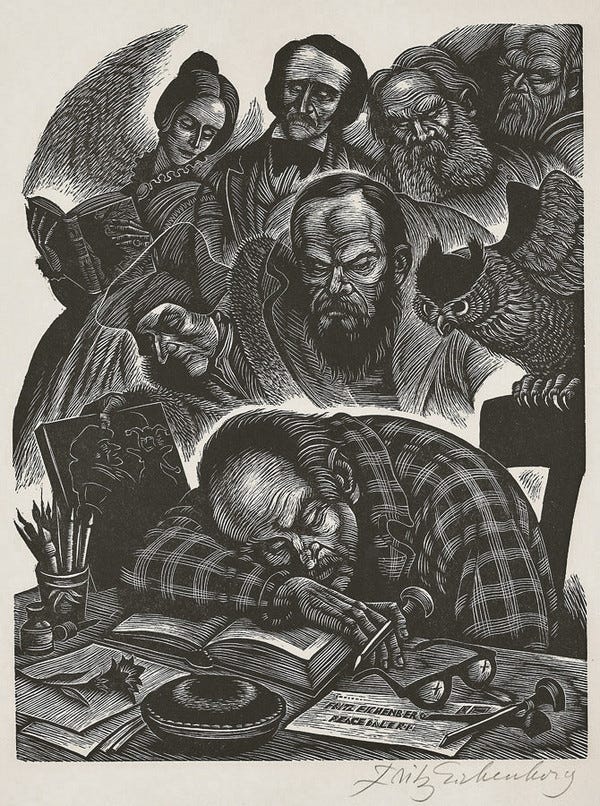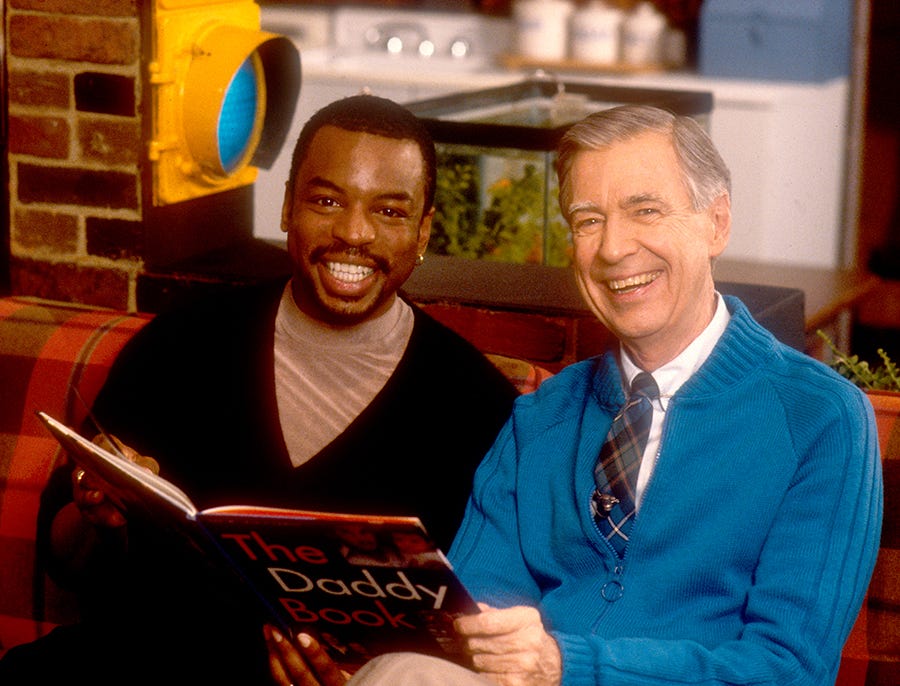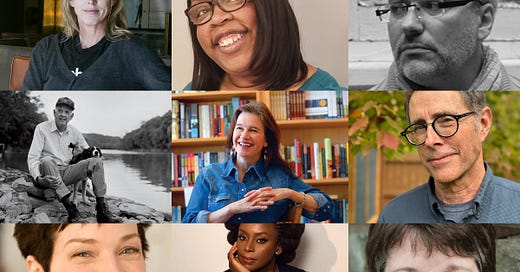The year is young, and I have already read several new articles by living writers declaring that no one publishes good Christian writing anymore, that Christian literary fiction is dead, and that The New York Times bestseller lists show that the public’s literary taste is insalubrious.1
As a devoted reader of books old and new, I must protest. Dear reader, I am coming to you from my overstuffed home library telling you contemporary Christian literary fiction is alive, well, and available at a bookstore near you. My local librarians valiantly rise to the Sisyphean demands of my hold requests. As a Christian2 who loves to read, I’ve spent years searching for the best Christian literary fiction being published today. Sunday was Candlemas and in the spirit of the season I’m taking the bushel off my light.
Definition by Question
With categories like these, I find using questions most helpful. If a book answers yes in all three categories, I consider it Christian literary fiction.
Christian: Does the novel consider eternal questions in the light of the Christian faith? Are spiritual experiences with the Christian God a major element? Does it lean upon Scripture, church history, or current Christianity for its inspiration?3
Literary: Does this book have artistic merit, even if the artistry does not accord with my personal taste? Does this work reward re-reading, deeper study, and analysis? Does this novel explore weighty topics like suffering, the human condition, or the meaning of life?
Fiction: Is this a novel? Does it tell a fictional story even if the subject/setting is historical/fantastical? Literary fiction is often realistic, but sometimes it overlaps with genres like speculative, fantasy, historical, contemporary, and more.
For a book to be Christian literary fiction, it need not have been written by an author who practices the Christian faith well, or at all. Many of these authors wouldn’t call themselves Christians, yet they examine Christianity in their fiction. It’s the same in history: George Eliot famously deconverted from the evangelical Anglican faith she was raised in, and still wrote Middlemarch. Les Misérables, a sermon-illustration standby, was written by Victor Hugo, a prolific adulterer.
What an artist can accomplish when they serve their work can transcend their time period, their personal interpretations of their work, and even their own moral lives. The moral vision of a novel often supersedes the author’s life. Similarly, we can choose to respond to literature (and literary history) by growing in virtue. We might learn from example, as in Dante Alighieri’s Paradiso; or from contrast, as in the Inferno; or from growing alongside, as in Purgatorio.
Not Safe, But Good
Longtime readers of literary fiction know that exploring the human condition means going to some uncomfortable places. So here I say: read at your own discretion. Follow your conscience. Having limits as a reader is a good thing (alas! we cannot read everything) but exploring beyond our comfort zones is often rewarding. The writers of Scripture did not elide human mistakes for our readerly comfort but chose to tell the truth, even when it was unpleasant. God knows humanity’s suffering and perpetuation of suffering: Jesus entered the human condition to the point of death, even death on a cross.

With Christian literary fiction, consider why the challenging content (violence, sex, language) is present. Usually it’s not to shock or titillate the reader, but to explore how far humans will go before turning to God. Neither should there be a lack of challenging content. Unlike light radio, Christian literary fiction does not exist to be positive, encouraging, or safe for the whole family. In the very best Christian novels, dark nights of the soul are followed by resurrection mornings. Trusting the author’s artistry has carried me through difficult passages to transcendent reading experiences.
In his article, “The Christian Lit Renaissance?,”
advocates for readerly hospitality:Hospitality also requires an ecumenical outlook, which means supporting and fostering dialogue between denominations and different expressions of Christianity. Literature shouldn’t have to be theologically correct for us to endorse it to each other. And literature shouldn’t have to vindicate God, the church, or religious experience at all. That’s not what it’s for.
What is literature for? Enjoyment, finding the good life, and growing in love, to name a few reasons. New books can help us do this as well as old books. As C. S. Lewis4 urged, we should not be chronological snobs, looking down on old books because they are old. Yet, we should not look down on new books only because they are new.5 Being good citizens of the present means reading what our contemporaries are writing, too.
Won’t You Be My Literary Neighbor?
I love reading old books. Because of this, I appreciate readers in the past who bought, read, and shared newly published books, so those books would be available to me today. More than critical reviews, more than film adaptations, more than bestseller lists, more than assigned reading curricula, what people enjoy reading determines what books will stick around in the literary consciousness. Wilkie Collins, Agatha Christie, and Alexandre Dumas père are not particularly literary, but they are beloved, which keeps their books in print. F. Scott Fitzgerald, Toni Morrison, and James Baldwin are widely taught, and their books are favored because people still love reading them.

Good books are like recipes: we want to keep them around and share them with our friends.6 Reading contemporary literary fiction gives us, readers in 2025, the chance to voice our opinions, slowly influencing what will be read in 2050, 2075, and 2125. Old is a relative term. Today’s new books are tomorrow’s old books. There are more books being published today than ever before,7 and there’s no way most of those books can be remembered for generations to come.8 Reading culture has already forgotten mega-bestselling authors of the past like E.D.E.N. Southworth; will Danielle Steel and Dean Koontz be similarly cherished in the 2100s? Maybe not. Southworth’s popularity did not inhibit the classicizing of her contemporaries Herman Melville, Mark Twain, Harriet Beecher Stowe, and more, even though there were about ten Southworths for every Melville. Neither should we let the quality of books on Target displays or in airport shops dictate our opinions of today’s literary fiction.
Finding good new books requires sifting. We can’t read everything, and choosing to read some new books doesn’t mean neglecting old books, following social media trends, or keeping up with celebrity book club picks. Time has sifted for us the books of the past, frequently losing gems along the way. Reading and sharing today’s worthiest books contributes to the glorious task of preserving good, true, and beautiful literature for tomorrow.
Living authors are our neighbors. Reading their books is neighborly, especially for those who hope to be published one day.9 Merrily promote your favorite living authors; charitably dislike your least favorite contemporary books. Always, tell the truth. Stewarding the fledgling reputations of new books is neighborliness to future readers, too, and that’s what I hope I am doing here.
32 Very Good Places to Start
Say you’re seated at my table with a cup of tea and a scone. We’re talking books (of course). You’re eager to start on all this wonderful Christian literary fiction that I’m nattering on about. This is what I am sending you home with (asterisks by my favorite books/authors):
Purple Hibiscus by Chimamanda Ngozi Adichie Hannah Coulter and Jayber Crow by *Wendell Berry Year of Wonders and People of the Book by Geraldine Brooks *City of Tranquil Light by Bo Caldwell Peace Like a River and I Cheerfully Refuse by *Leif Enger The Last Report on the Miracles at Little No Horse and Future Home of the Living God by *Louise Erdrich *I, Julian by Claire Gilbert Unfinished Desires by *Gail Godwin Phoebe and Lydia by Paula Gooder Transcendent Kingdom by Yaa Gyasi Small Things Like These by Claire Keegan Pachinko by Min Jin Lee The Ninth Hour by Alice McDermott Island of the World by Michael D. O’Brien Gilead, Home, Lila, and Jack by Marilynne Robinson The Great Passion by James Runcie Revelations and Illuminations by Mary Sharratt Abide with Me by Elizabeth Strout *Women Talking by Miriam Toews The Covenant of Water by Abraham Verghese Laurus by Eugene Vodolazkin The Dearly Beloved by Cara Wall Saving Ruby King by Catherine Adel West
All of these books were published between 2000-2024. The majority of these authors are still writing, to my knowledge, and many published in the twentieth century too. They range in age from 90s to 30s. Some of these titles are debuts (Saving Ruby King, The Dearly Beloved), some by award-winning and bestselling authors (Erdrich, McDermott, Strout). Knopf, FSG, Bloomsbury, and other literary publishers are sending these books into the world. One can’t read all of these books and think every single one an exception. While these authors and books are read frequently outside the church, I hope they become better read by the church. I’m not the only one reveling in this renaissance of Christian literary writing. There must be some marketable norm here because these books are selling and being read.

And I haven’t even read This Is Happiness by Niall Williams, Love Big, Be Well by Winn Collier, anything by Bret Lott, Kent Haruf, Sally Thomas, or many others.10 Due to my reading interests, I’ve favored women authors and those writing in English. Praise God, there’s so much more to discover! Please drop your recommendations below, that my to-read list may flourish like a tree planted by a stream of water.
I’m not trying to say that Christian literary fiction is in a perfect state today, or that there are no problems in the publishing industry. This is a reader’s perspective, not that of an author, editor, or publisher. I simply want to share the books I value that have traction in literary circles, but that I find to be overlooked by some articles on Christian writing today.
Thought-provoking, prayerful, astonishing Christian literary fiction is being published today. Tolle lege! Take up and read. To anyone who wants to contribute to the next 25 years of Christian literary fiction: “Scribere incipere!” Start writing. I’m here to read, and I’m not alone.
I doubt David Hume’s newest book outsold John Cleland’s in 1748. I don’t think Frances Parkinson Keyes’s repeated appearance on the 1951 NYT bestseller list taints the reputation of Graham Greene’s 1951 novel The End of the Affair. Nor do I think that the public’s current taste for Colleen Hoover means literature is dead. Would that we had fewer complaints about ephemeral book trends, and more clever, lasting satires like Northanger Abbey.
I am Anglican, and “Anglicans are much given to writing about themselves,” say Judith Maltby and Alison Shell on page 1 of Anglican Women Novelists. My ecumenical book-recommendation compulsion adds: see also Women of the Catholic Imagination, edited by Haley Stewart.
Religious literary fiction in general is my raison d’être as a reader, but this post is about my religion specifically. In Judaism, we have Chaim Potok’s My Name Is Asher Lev, a great American novel (and its sequel The Gift of Asher Lev, and The Chosen duology [unrelated to Jerry B. Jenkins]). Lisa See’s Snow Flower and the Secret Fan is an exquisite look at women in Confucian society. And Fatima Farheen Mirza’s A Place for Us, about a Muslim family, is compelling. These few titles are just a penny in the fountain of religious literary fiction.
Lewis was a bestselling author in his day—imagine if his contemporary readers had shunned his books because they were new and popular (plenty did, and missed out). There is no C. S. Lewis of today. Lewis had the corner on being Lewis. What we need are people inspired by him to create good things: see Susanna Clarke’s masterwork Piranesi, Silas Farley’s Four Loves ballet, and scholarship promoted by the Marion E. Wade Center.
1 Timothy 4:12 indicates that age should not be the only marker for worth among Christians.
We must account for differing tastes in literature as well as in food.
In 2022, 3,279,217 ISBNs were registered in the USA. International Publishing Data 2023, 304.
In 2025, that means some of these millions of books will be AI-generated slop (“Amazon Restricts Authors from Self-Publishing More Than Three Books a Day After AI Concerns”), or, as always, niche books lacking broad appeal.
The hubris of writing and expecting to be read without reading the work of one’s peers! Unfortunately, I’ve encountered this attitude frequently, online and offline.
I limited this post to fiction, so check out the Chrysostom Society for excellent Christian writers of poetry, non-fiction, and fiction, living (Sarah Arthur, Richard Foster, Daniel Nayeri, Luci Shaw) and deceased (Madeleine L’Engle, Eugene Peterson, Walter Wangerin Jr). Christian Poetry in America Since 1940 is a great way to meet new poets.





I'm so excited about this list as a reader, writer, and teacher! I definitely want to try to read through your list. So often I don't read Christian books because what is marketed as Christian has no depth, but I want to read the books that do.
I write literary fiction, though, and I'm not sure how to find readers for it. I am a Christian; my first book is not overtly Christian, though it has many Christian themes and metaphors. I hope that it will make people hungry for Christ, and I'm optimistic because my developmental editor said at the end that she thought maybe the main character should have a "religious conversion" or something. She's (the editor) right--she (the character) should, and that is exactly the point that I meant to bring her to. So that was gratifying, but I can't pay everyone to read it like I did with the editor, haha.
I really appreciate you bringing out the point that writing about a sinful world in need of God necessarily often goes to dark places. That's one thing that I think makes it hard to find a market; too many people think "Christian" is a brand that means safe, clean, etc., not something that tackles the hard things and applies hope to them, as it should.
It may make me a total nerd, but I'm salivating over Malcolm Guite's upcoming Arthuriad epic.